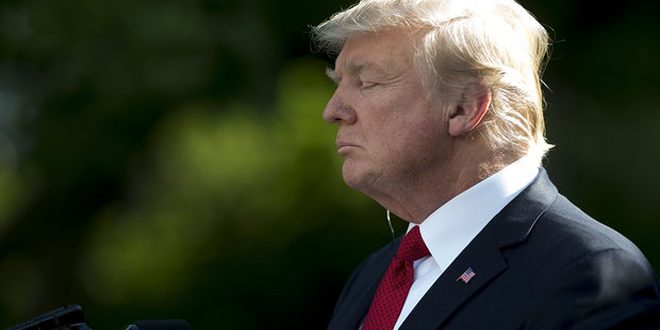By: Simon Tisdall
The US president’s preference for public bellicosity and instant military action has potential to cause a lot of damage.
Donald Trump’s warning of renewed US military action against Syria, backed by Britain and condemned by Russia, fits a now established pattern of aggressive White House behaviour favouring violence, or public threats of violence, over quiet diplomacy and private coercion. So far, the damage has been limited. But it’s early days.
In his approach to volatile international situations in the Middle East and elsewhere, Trump has often opted for instant military action or shows of military strength. At the same time, he has devalued or ignored conventional, slow-burn US mediation efforts that helped keep the peace during Barack Obama’s time in office, instead sidelining America’s diplomats.
US military involvement in Syria has been increasing steadily since January, most notably in the April cruise missile bombardment that followed an alleged chemical weapons attack. Expanding US intervention has raised tensions with Russia and Iran. Civilian casualties are also up sharply.
Trump has meanwhile shown no interest in advancing the UN-run Geneva peace process for Syria. This lack of US diplomatic engagement contrasts with the commitment shown by John Kerry, secretary of state in Obama’s second term. One result is a separate peace process sponsored by Russia, Iran and Turkey.
The perception that the US under Trump lacks a coherent strategy or vision for a postwar Syria (and Iraq), other than to deny territory and influence to Tehran and Moscow, is shared in other trouble-spots.
Afghanistan is one. Trump’s shoot-first-talk-later (or never) approach was vividly illustrated when the US detonated the biggest non-nuclear bomb in its arsenal there in April. Trump has since authorised troop reinforcements, reversing Obama’s draw-down.
But there is no discernible plan for ending the 16-year-long war and no diplomatic follow-up. If the aim of April’s raid was deterrence, as suggested at the time, it has not worked. A truck bombing in Kabul last month killed more than 150 people and further destabilised the pro-western government.
Trump’s public bellicosity led to a spike in tensions with North Korea this year after it conducted a series of missile tests. Trump threatened dire consequences, saying the crisis had entered a “new phase”. At one point Trump said a US naval armada, including nuclear-armed submarines, was heading for North Korea, only for it to emerge the ships were sailing in the opposite direction.
The confrontation prompted talk of nuclear war around the world. It came to nothing, for now at least. And Trump’s claim to have scored a breakthrough strategic success by inducing China’s to increase pressure on Pyongyang also proved illusory.
Such experiences do not modify Trump’s behaviour. In talks on Monday with India’s leader, Narendra Modi, he set war drums beating again.
“The North Korean [regime] is causing tremendous problems and is something that has to be dealt with, and probably dealt with rapidly,” he said. But what’s the plan? Nobody, probably himself included, knows what he means.
Trump’s repeated threats against Iran, given dramatic force by his recent speech in Riyadh when he called for Tehran’s international ostracism, have led American analysts to suggest the White House is actively contemplating forcible regime change – a throwback to the George W Bush years.
Saudi Arabia’s provocative move to isolate Qatar, Iran’s only ally among the Gulf states, is widely seen as the result of a green light, given by Trump in private, during his Saudi visit. This avoidable confrontation, with a deadline looming next week, looks extremely combustible, with the potential to suck in multiple countries.
All this contrasts sharply with Obama’s approach to Iran. He tried to encourage moderates and reformers in Tehran, and concluded a landmark nuclear agreement in 2015 that Trump has vowed to trash.
Stephen Walt, professor of international relations at Harvard, says Trump’s big-stick-and-no-carrots approach is making the world more dangerous. His conclusion is shared by respondents in a new Pew Research Center global survey. Only 22% expressed confidence Trump would do the right thing in world affairs, compared with 64% who trusted Obama.
“The US has pretty much abandoned its role as a potential mediator in lots of potential hotspots … If the past 25 years have taught us anything, it is that few foreign policy problems can be solved simply by blowing things up,” Walt wrote in Foreign Policy magazine.
“The real challenge is devising political solutions to conflicts once the guns have fallen silent. We’ve been singularly bad at this in recent decades, and Trump’s disdain for diplomacy and efforts to gut the state department will just impair us even more.”
The Guardian

